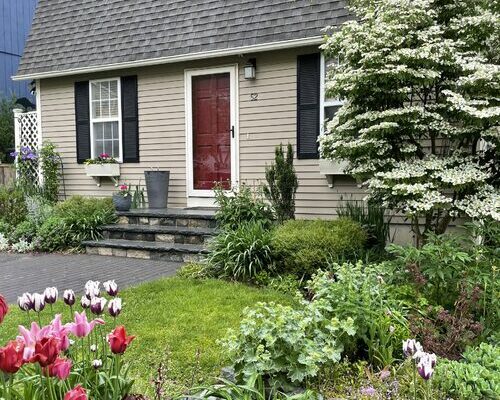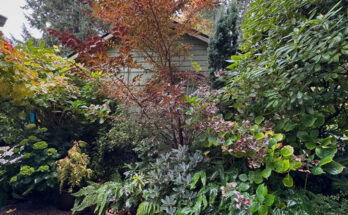We’re visiting with Beth Britt today.
I have been gardening on a tiny lot (about an eighth of an acre) in a western suburb of Boston for the last 25 years. I had helped my parents and grandparents in their vegetable gardens when I was a kid in North Carolina, but I didn’t know anything about ornamental gardening when my husband and I bought this house. Very few of the plants I started with remain, with the exception of several trees.
My biggest challenge has been dealing with the scores (no exaggeration!) of groundhogs who live in the stone wall behind our house and throughout the neighborhood. After years of trial and error, I’ve now mostly learned which plants they do not eat, although sometimes the newest additions to the groundhog clan will try things that the older generations shunned.
This series of photographs shows a partial view of my front garden peaking in spring and summer. All the plants in these photographs have proven unpalatable to the groundhogs in my neighborhood.
 I plant about 500 tulips in the front garden each year, treating them as annuals. This photo from the middle of May shows Mazus reptans (Zones 5–8) blooming in the lawn. The two low evergreens on either side of the steps are Thuja ‘Mr. Bowling Ball’ (Zones 3–7).
I plant about 500 tulips in the front garden each year, treating them as annuals. This photo from the middle of May shows Mazus reptans (Zones 5–8) blooming in the lawn. The two low evergreens on either side of the steps are Thuja ‘Mr. Bowling Ball’ (Zones 3–7).
 And here’s the front garden in late May. The star of late May is Viburnum plicatum ‘Summer Snowflake’ (Zones 5–8), which I’ve trained as a tree. I planted it in 2009. At its feet you can see the early dark foliage of Continus coggygria ‘Velveteeny’ (Zones 5–8). On the left trellis is Clematis ‘Elsa Spaeth’ (Zones 4–11). Lady’s mantle (Alchemilla mollis, Zones 3–8), daylilies (Hemerocallis hybrids, Zones 4–9), catmint (Nepeta sp., Zones 5–9), peonies (Paeonia hybrids, Zones 3–8), lamb’s ear (Stachys byzantina, Zones 4–8), Heuchera (Zones 4–9), Sedum, and Geranium are leafing out; groundhogs do not eat them! Overhead are a few leaves of a Constellation dogwood (Cornus × rutgersensis, Zones 5–10).
And here’s the front garden in late May. The star of late May is Viburnum plicatum ‘Summer Snowflake’ (Zones 5–8), which I’ve trained as a tree. I planted it in 2009. At its feet you can see the early dark foliage of Continus coggygria ‘Velveteeny’ (Zones 5–8). On the left trellis is Clematis ‘Elsa Spaeth’ (Zones 4–11). Lady’s mantle (Alchemilla mollis, Zones 3–8), daylilies (Hemerocallis hybrids, Zones 4–9), catmint (Nepeta sp., Zones 5–9), peonies (Paeonia hybrids, Zones 3–8), lamb’s ear (Stachys byzantina, Zones 4–8), Heuchera (Zones 4–9), Sedum, and Geranium are leafing out; groundhogs do not eat them! Overhead are a few leaves of a Constellation dogwood (Cornus × rutgersensis, Zones 5–10).
 Here is the garden in early June. One of my earliest mistakes was planting peonies (Paeonia hybrids, Zones 3–8) with little fragrance, as I didn’t realize yet how gardening in a small space demands that every plant do double or triple duty. I added the beautifully fragrant ‘Sarah Bernhardt’ peony a couple of years ago (middle of the photograph). To the far left is ‘Kansas’ peony, and to the far right is ‘Kelway’s Glorious’ peony; Allium ‘Gladiator’ (Zones 4–7) is in the foreground. Lady’s mantle, catmint, and Penstemon ‘Husker Red’ (Zones 3–8) are also in bloom.
Here is the garden in early June. One of my earliest mistakes was planting peonies (Paeonia hybrids, Zones 3–8) with little fragrance, as I didn’t realize yet how gardening in a small space demands that every plant do double or triple duty. I added the beautifully fragrant ‘Sarah Bernhardt’ peony a couple of years ago (middle of the photograph). To the far left is ‘Kansas’ peony, and to the far right is ‘Kelway’s Glorious’ peony; Allium ‘Gladiator’ (Zones 4–7) is in the foreground. Lady’s mantle, catmint, and Penstemon ‘Husker Red’ (Zones 3–8) are also in bloom.
 Late June is the time for ‘Happy Returns’ daylily, Monarda ‘Bee-You Bee-Free’ (Zones 5–9), Rozanne geranium (Geranium ‘Gerwat’ (Zones 5–8), and self-seeding rose campion (Lychnis coronaria, Zones 4–8). Blue grama grass ‘Blonde Ambition’ (Bouteloua gracilis ‘Blonde Ambition’, Zones 3–10) is in a pot.
Late June is the time for ‘Happy Returns’ daylily, Monarda ‘Bee-You Bee-Free’ (Zones 5–9), Rozanne geranium (Geranium ‘Gerwat’ (Zones 5–8), and self-seeding rose campion (Lychnis coronaria, Zones 4–8). Blue grama grass ‘Blonde Ambition’ (Bouteloua gracilis ‘Blonde Ambition’, Zones 3–10) is in a pot.
 In mid-July, more daylilies (‘Jolyene Nichole’ and ‘Strutter’s Ball’) follow, along with ‘Becky’ Shasta daisy (Leucanthemum × superbum ‘Becky’, Zones 5–9) and ‘Miss Manners’ obedient plant (Physostegia virginiana ‘Miss Manners’, Zones 3–9). I didn’t notice at the time I took the photograph that a birch tree across the street is reflected in the front door. How’s that for a borrowed view?
In mid-July, more daylilies (‘Jolyene Nichole’ and ‘Strutter’s Ball’) follow, along with ‘Becky’ Shasta daisy (Leucanthemum × superbum ‘Becky’, Zones 5–9) and ‘Miss Manners’ obedient plant (Physostegia virginiana ‘Miss Manners’, Zones 3–9). I didn’t notice at the time I took the photograph that a birch tree across the street is reflected in the front door. How’s that for a borrowed view?
 Paeonia ‘Kansas, with Iris ‘Caesar’s Brother’ (Zones 3–8) and Clematis ‘Elsa Spaeth’
Paeonia ‘Kansas, with Iris ‘Caesar’s Brother’ (Zones 3–8) and Clematis ‘Elsa Spaeth’
 I just learned the Hildene Star method of supporting peonies, shown here on Paeonia ‘Kelway’s Glorious’, with hakone grass (Hakonechloa macra, Zones 5–9) and Allium ‘Gladiator’ in the background.
I just learned the Hildene Star method of supporting peonies, shown here on Paeonia ‘Kelway’s Glorious’, with hakone grass (Hakonechloa macra, Zones 5–9) and Allium ‘Gladiator’ in the background.
 Monarda ‘Bee-You Bee-Free’ with ‘Miss Manners’ obedient plant, Geranium ‘Rozanne’, and Cotinus ‘Velveteeny’
Monarda ‘Bee-You Bee-Free’ with ‘Miss Manners’ obedient plant, Geranium ‘Rozanne’, and Cotinus ‘Velveteeny’
 This deck planter contains begonias (Begonia hybrid, Zones 10–11 or as an annual), coleus (Coleus scutellaroides, Zones 9–11 or as an annual), salvia (Salvia guaranitica, Zones 7–11 or as an annual), and Cuphea ‘Vermillionaire’ (Zones 8–11 or as an annual). Next to it is Clematis ‘Arctic Queen’ (Zones 4–9).
This deck planter contains begonias (Begonia hybrid, Zones 10–11 or as an annual), coleus (Coleus scutellaroides, Zones 9–11 or as an annual), salvia (Salvia guaranitica, Zones 7–11 or as an annual), and Cuphea ‘Vermillionaire’ (Zones 8–11 or as an annual). Next to it is Clematis ‘Arctic Queen’ (Zones 4–9).
Have a garden you’d like to share?
Have photos to share? We’d love to see your garden, a particular collection of plants you love, or a wonderful garden you had the chance to visit!
To submit, send 5-10 photos to [email protected] along with some information about the plants in the pictures and where you took the photos. We’d love to hear where you are located, how long you’ve been gardening, successes you are proud of, failures you learned from, hopes for the future, favorite plants, or funny stories from your garden.
Have a mobile phone? Tag your photos on Facebook, Instagram or Twitter with #FineGardening!
Do you receive the GPOD by email yet? Sign up here.
Source link
Originally posted 2022-10-29 19:17:11.







